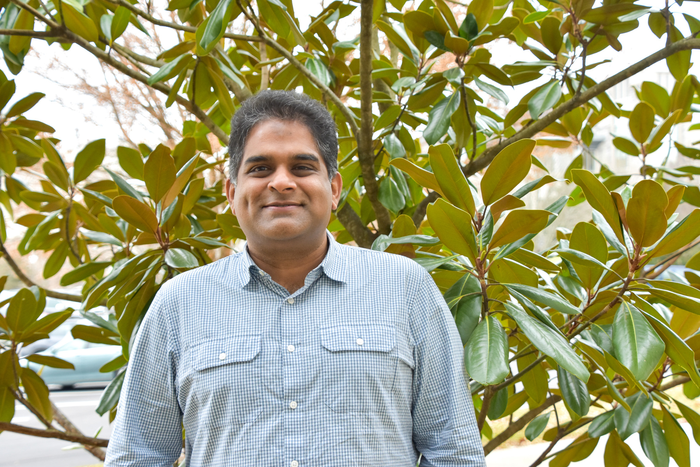Scientists have long known that when people sleep, the brain performs memory magic.

Credit: Virginia Tech
Scientists have long known that when people sleep, the brain performs memory magic.
People who sleep for eight hours after learning something new perform better than those who learn the new task during the day and are tested eight hours later without sleeping in between. More recently, scientists have discovered that odors and sounds presented during sleep can influence brain activity to further enhance the learning and memory benefits of sleep.
Now, Sujith Vijayan, an assistant professor in the School Neuroscience, part of the Virginia Tech College of Science, has received a $696,000 National Science Foundation CAREER award to study whether the brain’s work during sleep can also help people learn tasks associated with brain computer interfaces.
Vijayan is one of four College of Science faculty members to recently win the coveted CAREER grant, considered one of the most prestigious awards of its kind, supporting creative junior faculty who are expected to become future academic leaders. Frank Aylward of the Department of Biological Sciences, Satoru Emori of the Department of Physics, and Lauren Childs of the Department of Mathematics are all recent recipients.
Vijayan’s research involves brain computer interfaces – often shortened to BCIs – that allow an individual to use their brain activity alone to control an external device like a wheelchair or a cursor on a computer screen. Such interfaces can help people who have been disabled by neuromuscular disorders such as amyotrophic lateral sclerosis (ALS), spinal cord injury, or stroke regain functions so that they cam live more independently.
Until now, research into the effects of sleep on BCI task learning has entailed a few animal studies, which suggest there may be potential for human learning improvements.
But the specific ways that sleep affects learning of BCI tasks “remain a mystery,” Vijayan said. His aim is not only to discover details about those specific means, but also to investigate whether the manipulation of sleep through auditory signals might be used to enhance BCI learning.
“Although BCIs are gaining more traction in clinical settings, current applications often require intensive training to master,” Vijayan added. “If we could accelerate the learning of BCI applications through interventions that enhance natural sleep processes, it could improve the lives of people living with these frustrating conditions.”
Vijayan expects that these studies will not only have translational power but also allow for a deeper understanding of the role of sleep in learning and memory at a very basic science level.
“BCIs allow us to choose what features of brain activity and at what locations in the brain control a task, and we can then look at how the chosen activity is transformed through sleep. We can also examine how perturbations in the mapping that controls the BCI application differentially affect the underlying neural systems and impact learning. BCI applications really present a powerful tool for studying how sleep enhances learning and memory,” Vijayan said.
“All of us in the School of Neuroscience are excited for Sujith on this major accomplishment,” said Michael Fox, director of the School of Neuroscience. “This award recognizes the pioneering work that Sujith is doing here at Virginia Tech and with our clinical partners at Carilion Clinic in Roanoke. So not only is Sujith’s work important for our basic understanding of the neural mechanisms by which sleep impacts learning and memory, but it will have the potential to have a translational and clinical impact.”
Vijayan’s team will use a task in which subjects move a cursor on a computer screen by modulating their brain activity. Vijayan’s team will record neural activity of the subjects both while they are performing the task and while they are sleeping. Vijayan explains that neural activity will be recorded either using EEG in healthy subjects to probe large-scale neural dynamics, or using intracranial depth electrodes in patients undergoing invasive monitoring for clinical purposes, to probe circuit-level and single neuron dynamics.
They will then develop computational models to help with understanding the significance of the neural patterns they observe, and will develop methods for optimally manipulating neural activity during sleep.
Vijayan plans to make these computational tools widely available as open-source software to further the work of other researchers in the field. Vijayan was an early hire in the School of Neuroscience’s Computational and Systems Neuroscience track, and he will incorporate this research into its undergraduate program by adding components to his courses that focus on neural mechanisms and the principles related to BCI learning and sleep.
Vijayan will also help create an exhibit at the Science Museum of Western Virginia.
“I am super excited about creating an exhibit that will give children a better appreciation of the importance of sleep,” Vijayan said. “It will also allow me to finally get some credibility in the eyes of my 8-year-old.”




